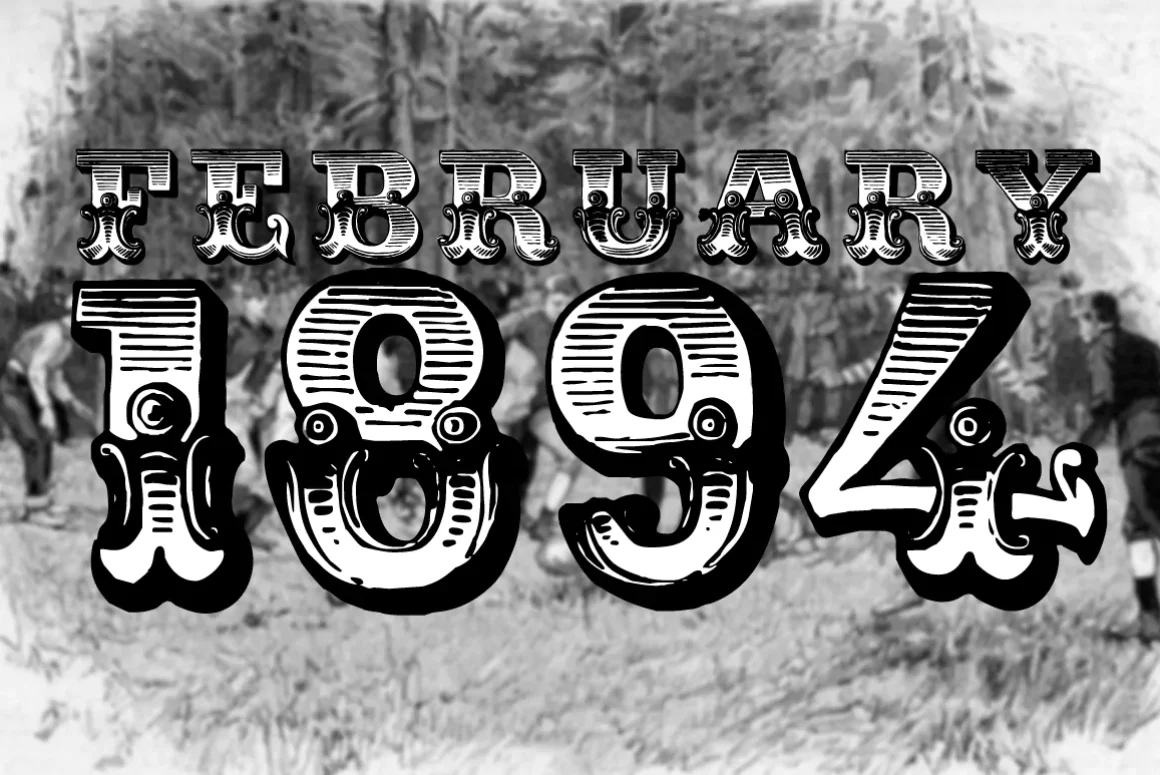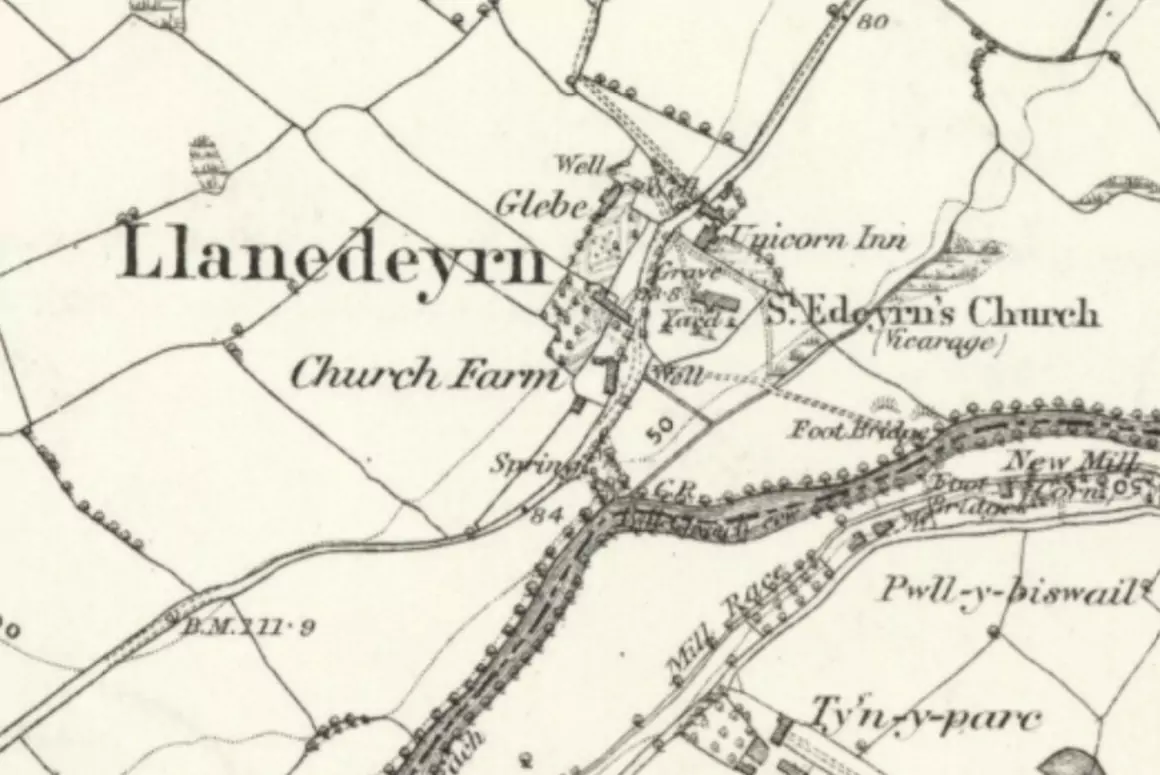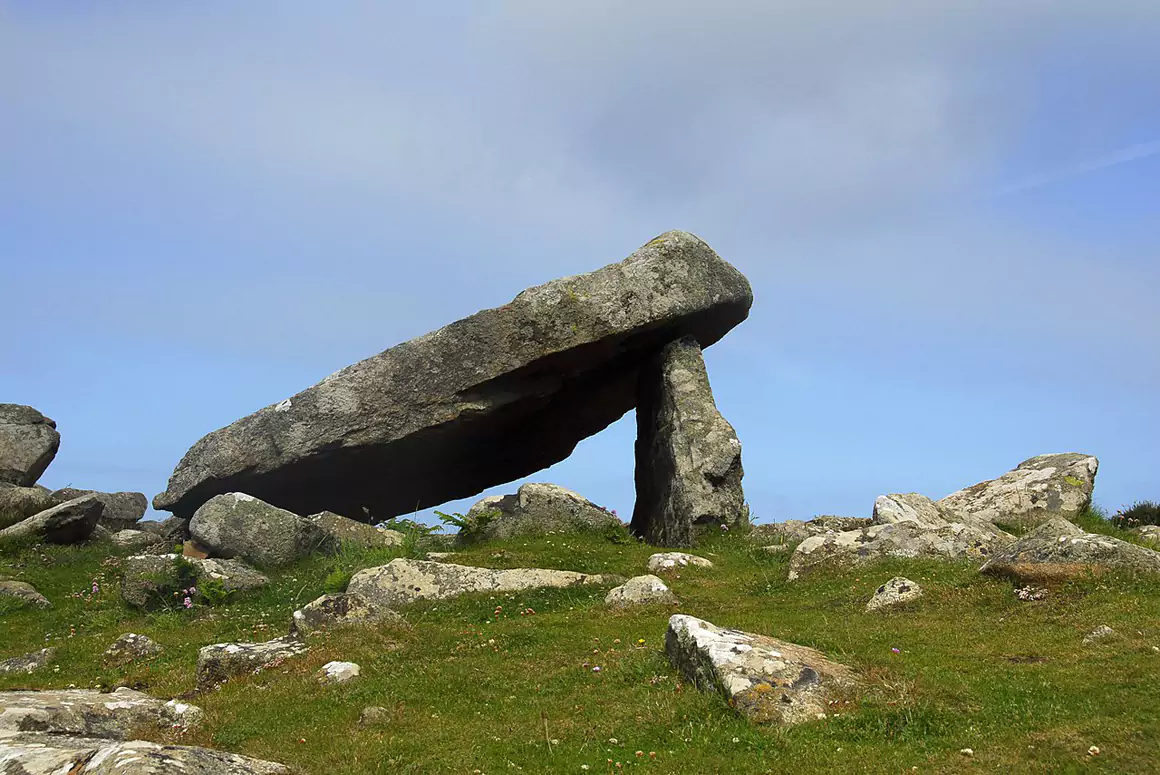![]()
I didn’t know this, but ‘Referee Baiting’ (or ‘Mobbing’) used to be a thing and February was a good month for it – or a bad month, it depends how you look at it. People, otherwise just like you, would turn out in the very worst weather conditions for an opportunity to abuse the official at a rugby match. And yes, we are talking about Welsh Rugby fans here, not the hooligan supporters of English soccer teams. And whilst it might be unpalatable, it is only right that you should know what they did and then find a chanced to atone for the terrible sins of your ancestors.

Let’s start on 20 February 1894, when the Evening Express, never a publication to promote reasoned and educated debate, went with the headline…
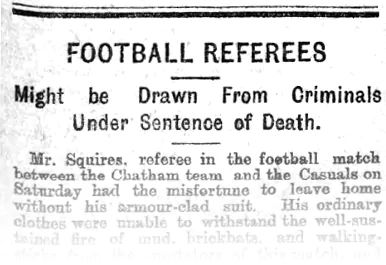
This is from a time when soccer and rugby had not been completely codified and rules, where they existed, were often negotiable or, indeed, interchangeable.
The article reflects the experiences of poor Mr. Squires, referee who, we are told, should have worn a suit of armour during the match, since his ‘ordinary clothes were unable to withstand the well-sustained fire of mud, stones, and walking- sticks from the spectators’. His waterproof coat was torn from his back as he was escorted from the field, guarded by a detachment of police. The reporter sympathetically reflects on what must have been a difficult afternoon.
‘In the olden days a task of great danger was allotted to a condemned criminal, who received a free pardon if he escaped death in its performance. The time seems to be at hand when the hazardous post of referee at a football match will have to go the same way’.
The crowd apparently became agitated by some of his decisions, frustrated presumably by the absence of VAR. ‘They hooted and hustled him, brandished sticks and umbrellas. One struck him, and another seized him by the collar and rent his mackintosh in two’.
One spectator tried to hit him with his umbrella over the heads of others but only succeeded in hitting a player and knocking him down. ‘Seeing his colleague on the ground the goalkeeper of the team aimed his fist at the nearest head, which proved to be that of a solicitor’s clerk who had taken no part in the dispute’. It was like a rehearsal for a Laurel and Hardy film, if you ask me.
‘Several of the spectators threw mud at the referee’, inaccurately it turns out, ‘and a considerable quantity hit the wrong people’. Ultimately Mr. Squires escaped under the protection of the police.
It was almost as if hooliganism was more attractive than the game itself. What a shock
0n 23 Feb 1897 the South Wales Daily Post reported that the habit of ‘MOBBING THE REFEREE’ could have serious consequences.

Following an assault upon a referee a week earlier, Cardiff Arms Park was closed as a punishment for five weeks. Mr. Harnett, the referee in the Cardiff- Newport match, complained to the Welsh Rugby Union about the conduct of Emery, one of the Cardiff players, and also the treatment he received at the hands of the spectators at the end of the match. Stern stuff, indeed.
However, the committee decided that they had no power to deal with the player, because Harnett had not complied with the rules of the Union by ordering him off the field, which does seem a bit unreasonable. The Cardiff Club however promised that it would deal him themselves.
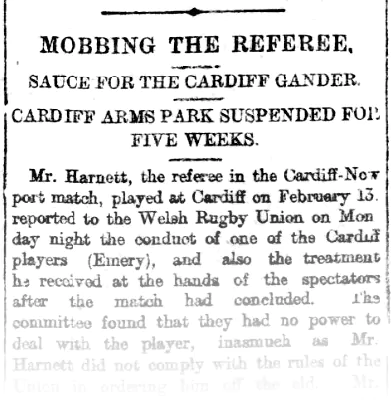
With regard to the mobbing of Mr. Harnett, the committee of the Union resolved that the Cardiff
ground should be closed until the end of March. Commenting on this decision, the Western Mail in its Day by Day column was not at all impressed. It reflected on similar incidents in Swansea, noting that Apparently a referee can be mobbed in Swansea but not in Cardiff. Why pick on Cardiff rather than Swansea?
To this the Swansea- based Cambrian newspaper felt it necessary to reflect that there are degrees in mobbing. Let’s be honest, they smirked and issued a reminder that no referee has ever had to seek refuge in the Swansea Police Station.
Both publications did agree though that closing the ground was extreme.
All a club can do is to exercise reasonable precautions for checking rowdyism, and to make every possible effort to protect the person attacked. There a club fails in these respects, it might justly be punished for neglect. But the real remedy, in our opinion, is the detention and conviction of the rowdies themselves and, wherever possible, their exclusion from the ground.
After all closing the ground impacts most of all on the club’s income and we can’t have that, can we?
Sadly, things did not improve, as the Evening Express pointed out on 14 February 1902.
REFEREE TROUBLES
Where the official found himself In a Hornet’s Nest at Trelewis.
It wasn’t a match as such, rather
A ROWDY FIGHT FROM START TO FINISH
It is a headline that is more likely to get your attention than merely reporting the score, I’d say.
The referee, appointed to adjudicate at this confrontation between Trelewis and Treharris on a bleak February afternoon, was Mr. Woodville of Cadoxton, who wrote a depressing and heartfelt letter to the secretary of the South Wales League Committee.
‘When you sent me to Trelewis, I never had any idea that it would be like it was or I would not have gone for five pounds. It was nothing but a rowdy fight from start to finish. Both with spectators and players the feeling was very intense. It appears that they had been planning all the week to cripple one another, and Trelewis were the greatest sinners in this respect’.
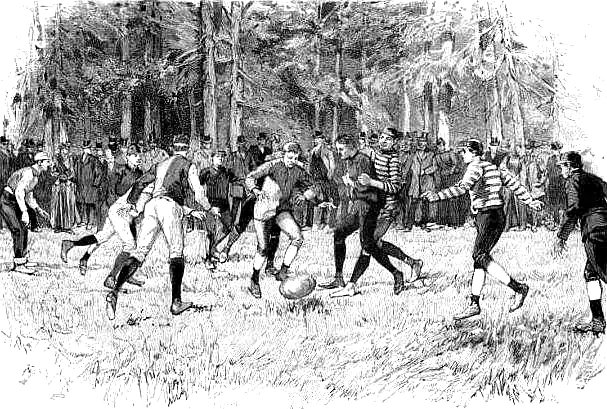
It is clear that refereeing in the mining districts was not a pleasant occupation. The focus was not upon tactics to ensure victory over the opposition, rather upon tactics that could maximise injuries to the opposition. The occasion needed ‘a dozen referees’, what with the spectators fighting and players cursing and threatening.
In his letter, Mr Woodville named two players who particularly offended him and had refused to accept any decisions he made. He concluded by describing the occasion as a hornet’s nest. ‘Trelewis players say I must have had money to square the match. If I could find out who said it I would prosecute him for slander’.
The Trelewis representative on the league committee that dealt with the complaint took a measured and statesmanlike view of this sorry afternoon. ‘The cause of it all was the Treharris Club, describing the letter as very one-sided’.
‘Was it a rough match?’ asked the Chairman
‘Well, rough in words—not in any other way’. After all, the Treharris supporters boasted that they ‘would break up the Trelewis Club if they could’.
The Treharris representative on the committee smiled and took a similarly lofty view of the afternoon, by reminding all present that not only had the Treharris players been forced to protect the referee after the final whistle but also that they had won the game.
It was eventually decided that such ill-feeling was natural between two clubs only half a mile apart. Everyone nodded wisely and the matter was adjourned to a future meeting when they would invite Mr Woodville and the offending players to attend.
I do hope that went well.


